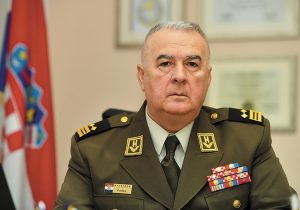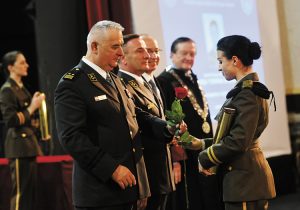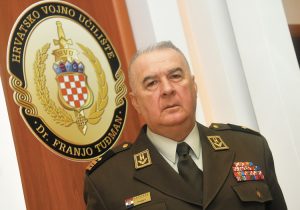The Croatian Armed Forces members, policemen and defenders took part in the 23rd traditional military…
New Approach to Organising Higher Military Education
 Ahead of the 27th anniversary of the establishment of Croatian Defence Academy “Dr. Franjo Tuđman”, we spoke with its commander, Major General Mate Pađen, who assumed the position exactly a year ago. Since the first generation of cadets in new military study programmes Military Engineering and Military Leadership and Management graduated earlier this year, General Pađen talked to CROMIL about those study programmes as well as the transformation of the military education system. He also revealed the plans for the development of the Croatian Defence Academy in the upcoming year.
Ahead of the 27th anniversary of the establishment of Croatian Defence Academy “Dr. Franjo Tuđman”, we spoke with its commander, Major General Mate Pađen, who assumed the position exactly a year ago. Since the first generation of cadets in new military study programmes Military Engineering and Military Leadership and Management graduated earlier this year, General Pađen talked to CROMIL about those study programmes as well as the transformation of the military education system. He also revealed the plans for the development of the Croatian Defence Academy in the upcoming year.
The first generation of cadets enrolled into military study programmes Military Engineering and Military Leadership and Management graduated earlier this year. These study programmes were jointly developed by the Croatian Armed Forces and the University of Zagreb. Four years ago, 91 cadets took their oath. How many finished their undergraduate studies? What is the pass rate?
In the first generation, which was enrolled in the academic year 2014/2015, 78 cadets from Croatia and four foreign cadets (two citizens of Bosnia and Herzegovina, one citizen of Montenegro and one citizen of Macedonia) successfully finished their undergraduate military studies. Taking into account the enrolment quota for that generation (50 cadets in each study programme) and the fact that some cadets dropped out during the Preparatory Camp, the pass rate of 86 % is very high. Apart from that, three remaining cadets from the first generation are expected to finish their studies in the current academic year. It also needs to be emphasized that we have also collaborated with the University of Zagreb on developing accredited graduate study programmes of Military Leadership and Management and Military Engineering. Starting with the current academic year, all cadets who have finished their undergraduate studies can continue their education on a graduate level. After two semesters, they acquire the academic title of a Master of Military Leadership and Management or a Master of Military Engineering.
Has the first generation of cadets already begun taking posts in the Croatian Armed Forces’ troops?
A total of 22 cadets have decided not to continue their education on a graduate level and have been assigned to the Croatian Armed Forces’ troops. We believe that the knowledge, skills and competencies which they gained during their undergraduate studies fit the needs of their initials positions in their troops. Their experience in their troops, as well as the feedback which we shall receive from them and their superiors will be very important to us as we further develop and improve the study programmes for the needs of the Croatian Armed Forces.
In comparison to the first generation of cadets, have some changes already been made in the curricula of these study programmes?
Minor amendments have been implemented, but it was only when the first generation of enrolled cadets finished their study programmes that preconditions for a stern evaluation were fulfilled. The compulsory process of amending the elaborates of the study programmes will take place in the upcoming period. When the first generation of cadets enrolled in graduate study programmes completes their studies, these programmes will be evaluated, as well. Our objective is to continually develop and improve our higher education and to enable future officers the acquisition of necessary expert military knowledge. That is the only way how we can raise the cadets’ readiness for their first officer duties and create good foundations for a continued professional development through sequential and progressive military education.
 In collaboration with the University of Split, a new integrated undergraduate and graduate study programme Military Maritime Studies was established for the purposes of the Croatian Navy. Has there been any interest?
In collaboration with the University of Split, a new integrated undergraduate and graduate study programme Military Maritime Studies was established for the purposes of the Croatian Navy. Has there been any interest?
The aim of this study programme is to educate future officers of the Croatian Navy as well as employees of the Ministry of the Interior and the Ministry of Maritime Affair, Transport and Infrastructure. Students acquire theoretical and practical knowledge and skills which are important for the maritime trade as well as learn about procedures regulated by the International Convention on Standards of Training, Certification and Watchkeeping for Seafarers (STCW) and other national and international standards. At the end of their studies, the cadets’ general competencies are equal to those acquired in other naval colleges. The enrolment quota in the first generation was filled; 31 cadets from the Republic of Croatia and two cadets from Montenegro were enrolled. Taking into account the short amount of time that we had to present that study programme, we are pleased with the interest of secondary school seniors.
How do you grade the Ministry of Defence’s co-operation with the universities in Zagreb and Split in the process of transforming the system of military education?
We are extremely pleased with the co-operation with both universities. The co-operation with the University of Zagreb began during the consultations about the necessity and the possibility of developing independent military study programmes and continued with the accreditation and implementation of initially undergraduate and now graduate study programmes. Today, we can say that our co-operation has grown into a partner relationship. Although initiated at a later point, the co-operation with the University of Split has also been conducted on a high expert and professional level so far. The Croatian Defence Academy is a link between academia and the Croatian Armed Forces’ troops.
What is the ratio between theory and practical work? How much time do cadets spend in the classroom? To what degree is the theoretical knowledge implemented on the field?
When designing the elaborate of the study programmes, I tried to find the optimal ratio between the theoretical and the practical part of cadets’ education. An additional challenge was aligning the academic part of the study programmes with the expert military one. That meant that I had to approach the design of military contents from a scientific level. In the existing elaborates of our undergraduate military study programmes, the percentage of practical contents increases each year and reaches its peak in the fourth year, in courses related to military expert work of cadets’ branches. It needs to be stressed that military study programmes contain not only academic content, but also military training, which is conducted all year long, including winter and summer. The field work is an invaluable part of the cadets’ training for their first officer duties in the Croatian Armed Forces.
What about international co-operation? Do cadets have an opportunity to receive education at military academies abroad?
In 2018, the Croatian Defence Academy’s co-operation with international military academies improved significantly. We joined Erasmus+, the largest EU programme for education, training, youth and sports. In just a few months, we set up a partnership with several scientific and educational institutions from EU countries through Erasmus+ agreements. This allows us to use the EU’s funds for programmes of academic mobility, access new knowledge and strengthen our expertise. We are preparing to sign more agreements and a growing number of foreign institutions are interested in signing an agreement and co-operating with the Croatian Defence Academy.
We are actively involved in the Military Erasmus initiative, the goal of which is to harmonise European officers’ basic military education and to increase the level of interoperability among participating countries, which in turn strengthens security in Europe. By getting involved in this programme, we have been given the possibility to exchange our cadets and our teaching staff with other military schools in the EU as well as to co-operate on the development of new curricula.
Through these programmes, our cadets are sent to attend military modules of foreign educational institutions. So far, our cadets have been to the Theresian Military Academy and two cadets will be going to the Royal Military Academy in Belgium. Next year, cadets from Romania, Bulgaria and American military academy West Point will come to Croatia. We have also signed agreements on co-operation with the Czech Republic, Hungary and Poland.
I also want to mention that the European Security and Defence College (ESDC) organizes the Common Security and Defence Policy Olympiad (CSDP Olympiad), the participants of which are cadets from higher educational institutions from EU member countries which have joined the Military Erasmus initiative. The Olympiad is held biannually in the member country which presides over the EU in the first half of the year. Considering that the Republic of Croatia will be presiding over the EU in the first half of 2020, when the next Olympiad is supposed to take placed, the Croatian Defence Academy will be its organizer. That is an excellent opportunity for the promotion of Croatian military education and Croatia on the whole.
Aside from that, activities related to the mobility of the teaching and non-teaching staff between the Croatian Defence Academy and foreign educational institutions are currently being conducted or planned.
Do most lecturers in new military study programmes at the Croatian Defence Academy come from the Croatian Armed Forces or from outside the defence system? Is the number of members of the Croatian Armed Forces who are certified to lecture growing?
The teaching staff in university study programmes must have the adequate and strictly regulated academic degrees. Most of the lectures are still held by university lecturers, while exercises and seminars are held by lecturers and experts from the military system. However, vast improvements have been made in developing the scientific and teaching staff from the Croatian Defence Academy and the Ministry of Defence. The Croatian Defence Academy’s main objectives are lecturers’ post-graduate training and invitation to scientific and teaching occupation as well as the development of scientific and research activity in the interdisciplinary field of Military, Defence, Security and Intelligence Arts and Sciences.
Will the acquisition of new equipment and the investment in the modernization of the Croatian Armed Forces lead to amendments to the study programmes? Will the programme for the education of a new generation of pilots be adjusted to these processes?
Since the idea of developing and starting new study programmes was motivated by the changing needs of young officers regarding their education within the Croatian Armed Forces, in accordance with the existing Capability Objectives, it is realistic to expect that some changes will be made to the education of the new generation of pilots. These changes will not just affect their military training, but also the academic part of their education.
 What are some of the novelties in the training and education of NCOs and officers?
What are some of the novelties in the training and education of NCOs and officers?
In accordance with the strategic documents of the Ministry of Defence, we continually amend curricula and teaching methods and coordinate them with the design of curricula in civil institutions of higher education. The General Staff of the Croatian Armed Forces, the commands of military branches, the Special Forces Command and the Support Command are responsible for the definition of competencies that students at the Croatian Defence Academy ought to acquire. Qualification standards and learning outcomes are set on the basis of these competencies. This is a continuous process that involves both the institution where the education takes places and the troops where soldiers work once they are finished with their education. In this way, we keep up with the demands of the current security climate and the necessary implementation of contemporary weapons systems and war doctrines. If I were to single out the most important change in the education of NCOs and officers in the last few years, it would certainly be the greater presence of interactive teaching through different exercises, e-learning and practical work in the troops. This has replaced the classical method of frontal teaching. In order to achieve that, it was necessary to install high-quality equipment into demonstration rooms and classrooms (e.g. in the demonstration rooms for the courses Communication and Information Systems and Military Intelligence Branch). The lecturers also had to gain new competencies in order to teach using these new methods.
It is important to point out that the International Command Senior Enlisted Course was conducted for the second year in a row, from 20th to 31st August. The objective of the course was to train NCOs for work on an operative and strategic level in a multinational environment on four levels of sequential and progressive military education which are conducted at the Croatian Defence Academy and which are international in character. By conducting this course, the Croatian Defence Academy raises the level of the implementation of NATO directives and guidelines which define the education and competencies of NCOs as well as the level of interoperability in an international environment. The highest-ranking NCOs from the armed forces of Austria, Bosnia and Herzegovina, Montenegro, Kosovo, Hungary, Macedonia, the United States of America, Slovenia and Croatia, the host country, successfully completed the course. High-ranking NCOs and officers from the Croatian Armed Forces as well as NATO and A-5 member countries regularly attend the course as guest lecturers.
This year, lectures at the course were held by the Chief of General Staff of the Croatian Armed Forces General Mirko Šundov, Brigadier General Gordana Garašić, Senior Enlisted Leader of ACO NATO SHAPE Command Sergeant Major Davor Petek, Senior Enlisted Leader of USEUCOM Fleet Master Chief (SS/SW) Crispian D. Addington, high-ranking NCOs from the Croatian Armed Forces and me.
How do you plan to develop the Croatian Defence Academy in the upcoming year?
Further development of education for the needs of the Croatian Armed Forces is a strategic determinant of the Republic of Croatia, rooted in the Croatian Armed Forces Long-Term Development Plan 2015-2024, which was adopted by the Croatian Parliament in December 2014. Most of the planned activities have been successfully carried out. I will single out the accreditation and the organisation of the aforementioned university military study programmes as one such activity. The crown of the whole process will be the establishment of an institution of higher education in the defence system. A new approach to higher military education is necessary because of the challenges in organising a large number of military study programmes, the specific development of military sciences, the need to develop educational and research projects with NATO and the EU, the mobility of students and teachers as well as their special status as active duty officers. In accordance with the strategic guidelines, following expert consultations between the competent ministries and the academia, the creation of legal requirements for the transformation of Croatian Defence Academy “Dr. Franjo Tuđman” into the University of Defence and Security is planned for next year. I must emphasize that the upcoming transformation of the Croatian Defence Academy is not the largest military transformation, but it is the most complex one. It is planned as a joint project by the Croatian Armed Forces, competent national authorities and the academia.
Interview by MARTINA BUTORAC
Photo by TOMISLAV BRANDT
